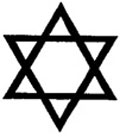No edit summary |
|
(No difference)
| |
Revision as of 11:02, 26 April 2012
| Ehudism | |||||||||||||||||||||
|---|---|---|---|---|---|---|---|---|---|---|---|---|---|---|---|---|---|---|---|---|---|
| |||||||||||||||||||||
Ehudism is the native religion of the Beiteynuese people, and is one of Terra's oldest extant religions. Deriving from the traditional mythology of the Qedarite peoples, Ehudism is one of the first monotheistic religions.
History
The Qedarite Migrations (1500 BCE-300 BCE), one of the largest migrations in human history, brought the Qedarite peoples from Squibble to Majatra via Seleya, and led to the founding of numerous colonies across the Majatran lands. Several Qedarite tribes settled in Cildania, and, according to Ehudi mythology, a Qedarite young boy named Ehud claimed to be hearing the word of Elyon (God):
«Go West to the promised land of olives and meadows and there you will find the home of the Qedarites.»
|
He is said to have left with a large group of followers towards Beiteynu, where he established the city of Yishelem, the most holy city in Ehudism. Those Qedarites that remained behind became the ancestors of today's Cildanians. This movement was accompanied by the establishment of God as the central divinity of the Beiteynuese people. Over time, Ehudism became the established religion of Beiteynu, which many Ehudis believe to be a Holy Land promised to them by their deity. This belief can be seen in the translation of Beiteynu, lit. 'Our Home' .
It was upon arrival in Beiteynu that most historians now believe that Ehudism in the form we see it today was created. Similar to how the Qedarite language was fused with the proto-Jelbék tongue of Ehudi converts to form the Beiteynuese language, it is now generally accepted that as new converts from the various Majatran tribes joined with the Qedarite migrants, many local customs were mixed with the traditional Beiteynuese culture to form what we would now recognize as Modern day Beiteynuese Customs.
Ehudism has over time given rise to various sects as well as two separate major religions, Christianity around five centuries after the founding of Ehudism and to a lesser extent, Queranzariah, founded in the eighth century. One minor religion to sprout from Ehudism is Schultzism, founded in the twenty-eighth century.
Beliefs
Ehudis only worship Elyon, but they accept the existence of other divinities. In Ehudi belief, every nation has its ruling god, and Elyon, although being by far the most powerful god, is the god of the Beiteynuese people.
Holy Book
The holy book of Ehudism is the Katub.
Organization
The main body of Ehudism is the Ehudi Church of Elyon, headquartered in Yishelem. The religious buildings of Ehudism are called temples, and the Ehudi clergy is formed of priests, all headed by the High Priest of the Ehudi Church.
| Beiteynu < Majatra |
| Portals: History, Geography, Culture, Governance, Diplomacy, Economy, Intelligence, Military |

